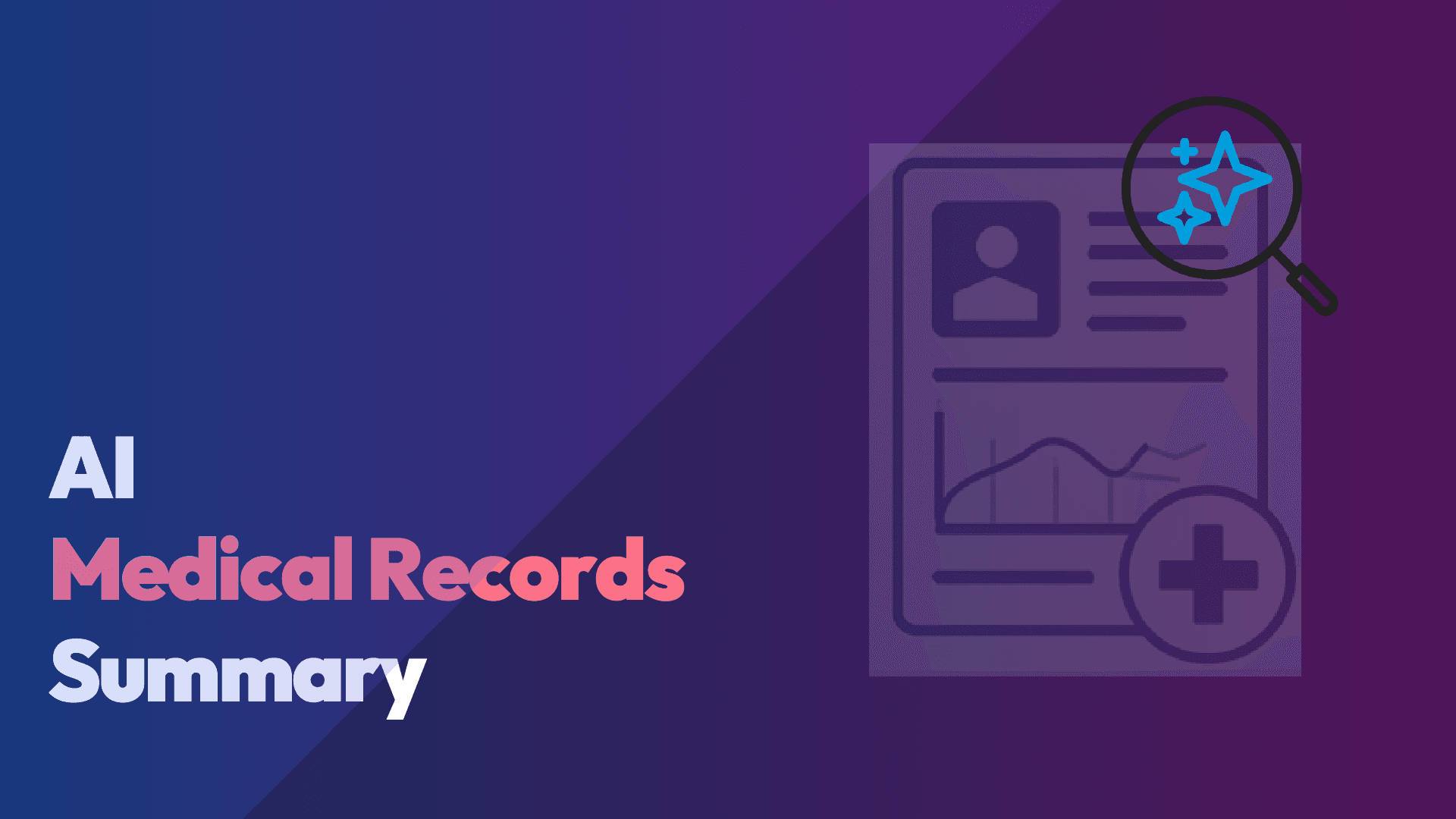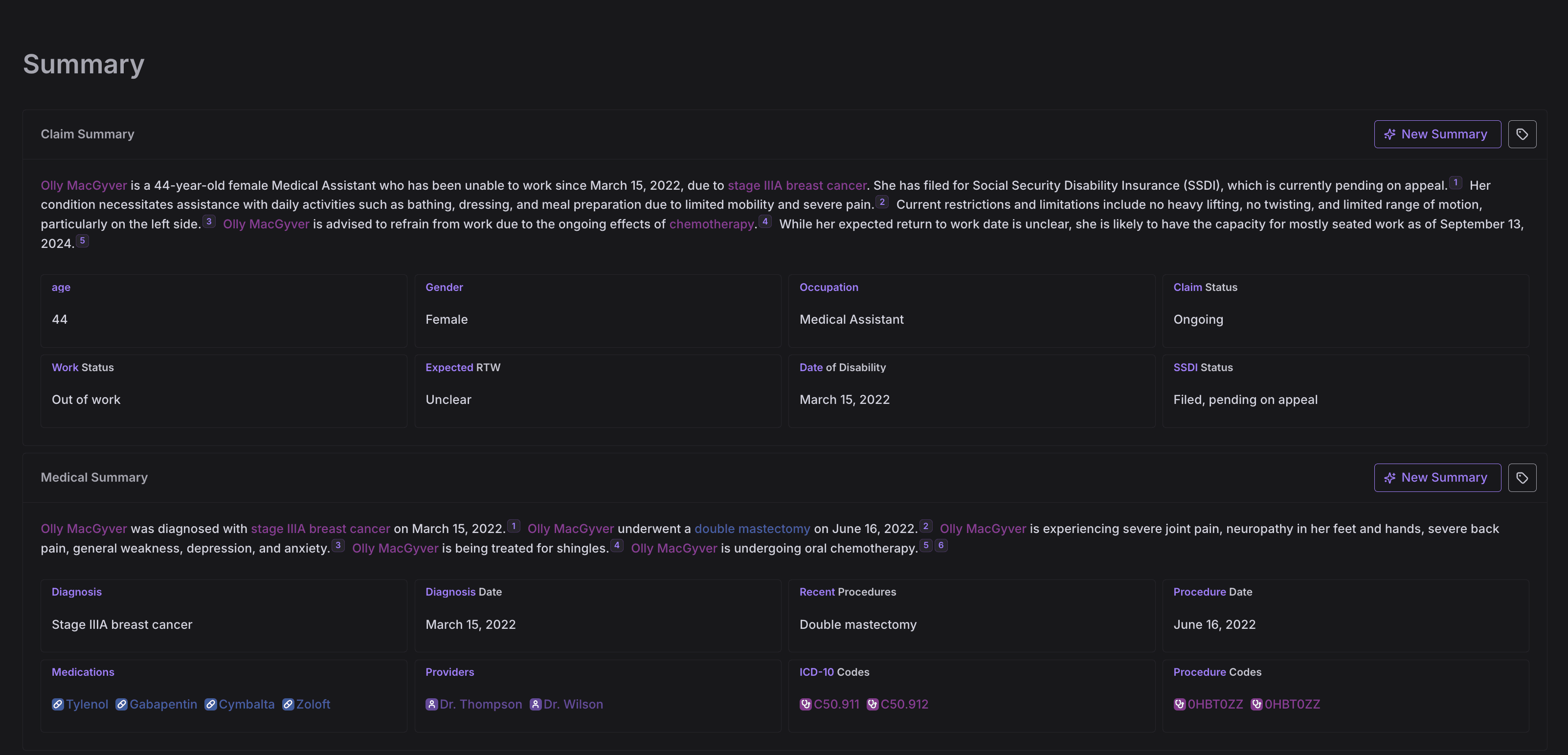
Creating an AI Medical-Records Summary for Claims
Extract Critical Insights from AI Medical Summaries for Faster, Fairer Claims Decisions
Managing medical documentation within claims operations is complex.
Medical records are challenging to understand because the data is spread out across hospital-discharge summaries, physician notes, diagnostic-imaging reports, physical-therapy records, and specialist consultations.
Claims investigators spend significant time reviewing medical documents—30–60 days on average, and sometimes up to 90—to extract critical information about injuries, treatment timelines, and recovery progress that directly impact claims decisions.
AI medical-records tools transform this document-intensive process by automatically analyzing complex information and generating structured summaries, preserving clinical accuracy while dramatically reducing review time.
Rather than replacing human expertise, AI medical summaries enhance capabilities by organizing vast amounts of medical data into accessible, actionable insights.
This article explores what AI medical records summarization means for claims processing, how it benefits insurance teams, and considerations around compliance, quality, and ethics that ensure fair, efficient claims handling.
What Is an AI Medical-Records Summary?
According to the research firm McKinsey, AI will help insurance carriers recognize fraud more easily and process claims faster & more accurately. Using AI to summarize medical records is a big step forward in this new future for insurance.
An AI medical-record review processes complex medical documentation to create comprehensive summaries that highlight the most relevant information for insurance-claims evaluation.
Beyond simple text extraction, AI in medical-records retrieval understands medical terminology, treatment sequences, and the relationships between healthcare events.
Unlike generic document processors, insurance-focused AI for medical records identifies the most relevant information for claims decisions, like injury patterns, indicators of treatment effectiveness, disability assessments, and recovery timelines.
AI for medical-record summaries designed for insurance understand both the insurance and medical sides for processing different types of claims.
For example:
- Workers' compensation claims need a detailed analysis of workplace-injury mechanisms and occupational health factors.
- Disability claims need a comprehensive assessment of functional limitations and treatment responses.
- Healthcare-insurance claims demand verification of medical necessity and treatment appropriateness.
Today, document processing isn't limited to text. Advanced vision-language models understand visual elements too, such as imaging reports and hand-drawn diagrams.
The most sophisticated systems link multiple AI technologies together to create a whole greater than the sum of its parts, ensuring the summarization process doesn't overlook any critical medical information.
How Insurance Teams Benefit from AI Medical-Records Analysis
AI technology for medical-narrative summaries benefits insurance companies across the organization.
Multiple insurance departments can improve operations by enabling teams with tools to process complex medical information more efficiently, while protecting and empowering the uniquely human expertise that drives excellent claims outcomes.
Claims-Processing Teams
Adjusters handling disability claims face the challenge of synthesizing info from diverse sources across months or years of treatment. AI for summarizing medical records organizes this info chronologically and highlights key medical events that impact claims.
For workers' compensation claims, AI identifies workplace-injury details, correlates them with medical findings, and tracks a treatment's effectiveness over time.
The organized presentation speeds up claims processing, saving adjusters from spending hours manually reviewing scattered medical records. Instead, adjusters can quickly apply their expertise and make informed coverage decisions.
To summarize medical records, AI captures structured & unstructured data to paint a comprehensive picture, helping claims teams pinpoint gaps in care, treatment-compliance issues, or potential pre-existing conditions that may affect claims outcomes.
OwlVision, Owl.co's AI document processor, reads handwritten physician notes, digests faded medical charts, and extracts data from both digital records & scanned documents so that no medical information is lost or missed.
Investigation and Fraud Teams
AI-powered medical-record analysis identifies patterns and inconsistencies across multiple documents and time periods, aiding special-investigation units in their complex, strenuous work.
AI medical summaries organize evidence for investigators, detecting discrepancies between reported symptoms & documented medical findings and highlighting treatments that seem inconsistent with claimed injuries.
The AI is trained on fraud patterns to spot red flags, such as when medical chronologies show gaps in treatment or misalignments with policy coverage.
This analytical capability helps investigators decide what evidence supports or challenges claim narratives. Special units can redirect their expertise to truly suspicious cases that require human-led investigations, rather than spending time on routine document review.
Legal and Compliance Teams
Insurance lawyers & paralegals require detailed documentation that can withstand scrutiny in litigation or regulatory review.
Medical-record reviews that come with AI for insurance-legal teams maintain complete audit trails showing exactly how medical information was extracted and analyzed, providing the transparency necessary for legal proceedings.
AI also identifies missing medical documentation that could impact claim defensibility, backing legal teams by ensuring they have complete medical records before cases proceed to litigation or settlement negotiations.
How to Use AI to Summarize Medical Records
AI for medical-records analysis leverages document-processing technology to capture structured and unstructured data from medical files.
Machine-learning technology that understands insurance-specific context then curates and displays info about appointments, diagnoses, prescriptions, treatments, and more, with citations and fact-based insights, to help teams quickly understand complex claims details.

Here's an example of an AI medical-record summary for claims teams with medical details of a fictional claimant, inclusive of pertinent details concerning diagnoses, medications, procedures, etc.—all with click-through citations to easily discover source material.
In Owl.co's Claims Intelligence platform, medical-record summaries extend beyond chronology charts with OwlAssist, providing conversational research to simplify claims processing with instant, evidence-based answers to specific queries from claims teams.
For example, adjusters can ask, "What were the treatment recommendations for this claimant's back injury?" and receive detailed responses with direct citations to the relevant medical records.
Plus, non-textual gen-AI creates visual representations of medical information to further streamline investigations. For instance, OwlAssist can generate body diagrams showing injury locations, treatment areas, and recovery progress over time.
Protecting Against Risk with AI in Medical-Record Reviews
Insurance executives rightfully prioritize quality, compliance, and ethical considerations when implementing AI systems for medical-record analysis.
Medical-record summary platforms with AI address these concerns through wide-ranging safeguards and human-oversight mechanisms.
Ensuring Accuracy and Quality
Owl.co's AI document automation for insurance leverages a custom-curated vision-language model for best-in-classic accuracy rates in processing structured & unstructured data from claims files.
The AI is trained uniquely on insurance data to comprehend context in medical terminology and insurance claims.
Plus, multilayered validation protocols and human-in-the-loop feedback ensure vigorous data-precision standards for optimal insights from medical-record summaries.
Experienced claims specialists can review AI-generated summaries to verify accuracy and provide feedback that continuously improves system performance.
And with explainable AI in insurance, claims teams can easily assess the rationale behind every insight in a medical-record summary with citations traced back to source documentation, enabling trust and accountability.
Compliance and Regulatory Standards
Enterprise-grade AI medical-records systems maintain HIPAA compliance, SOC 2 certification, and other regulatory standards necessary for handling sensitive medical information in insurance.
Owl.co provides complete audit trails showing exactly how medical information was accessed, processed, and analyzed.
Ethical AI and Bias Mitigation
Advanced AI systems address potential bias through deterministic analysis that examines each medical record based on its specific clinical content rather than making assumptions based on demographic factors or historical patterns.
This approach forms the foundation for consistent, fair treatment across all claimants.
AI for claims processing maintains transparency in decision-making by providing clear explanations for how it interprets and summarizes medical information, empowering claims teams to understand, validate, and defend AI recommendations.
Human-Centric AI
Implementing technology for medical-records summaries requires a strong partnership between AI and humans.
The technology handles time-consuming document-processing tasks and AI document classification for insurance while enabling experienced claims professionals oversight capabilities to ensure fairness for claimants.
With AI medical-record summaries, claims teams can quickly analyze and understand the nuances of a claimant's medical history while taking accountability for important decisions that impact people's very livelihoods.
Claims Intelligence: A New Approach to Medical-Record Analysis
AI medical-record summary technology isn't a bubble. It's a genuine advancement in how insurance organizations approach medical-documentation challenges.
With Claims Intelligence from Owl.co, which combines advanced AI with fact-based data, claims teams can feel confident that AI-generated medical summaries will enable them to analyze a claimant's medical history to make faster & fairer claims decisions.
Medical-record summaries from accountable, effective, and ethical AI provide a new way to research insurance claims that merges sophisticated document-processing capabilities with industry-specific knowledge, robust compliance safeguards, and human expertise.
Ready to transform how your teams process and parse medical records with the leading AI medical-records summary tool? Book a demo to see our comprehensive AI toolkit in action!
